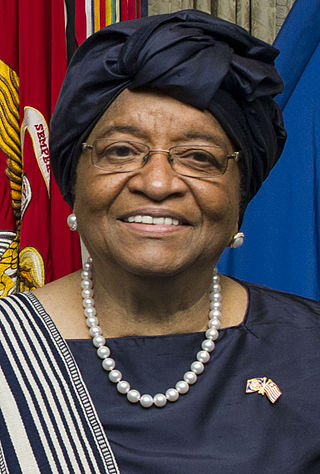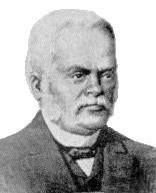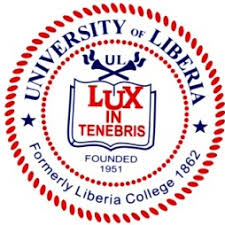
The Armed Forces of Liberia (AFL) are the armed forces of the Republic of Liberia. Tracing its origins to a militia that was formed by the first black colonists in what is now Liberia, it was founded as the Liberian Frontier Force in 1908, and retitled in 1956. For almost all of its history, the AFL has received considerable materiel and training assistance from the United States. For most of the 1941–89 period, training was largely provided by U.S. advisers, though this assistance has not prevented the same generally low levels of effectiveness common to most of the armed forces in the developing world.

Samuel Kanyon Doe was a Liberian politician and military officer who served as the 21st President of Liberia from 1986 to 1990. He ruled Liberia as Chairman of the People's Redemption Council (PRC) from 1980 to 1986 and then as president from 1986 to 1990.

The president of the Republic of Liberia is the head of state and government of Liberia. The president serves as the leader of the executive branch and as commander-in-chief of the Armed Forces of Liberia.

Monrovia is the administrative capital and largest city of Liberia. Founded in 1822, it is located on Cape Mesurado on the Atlantic coast and as of the 2022 census had 1,761,032 residents, home to 33.5% of Liberia’s total population. Its largely urbanized metro area, including Montserrado and Margibi counties, was home to 2,225,911 inhabitants as of the 2022 census.

The Kru, Krao, Kroo, or Krou are a West African ethnic group who are indigenous to western Ivory Coast and eastern Liberia. European and American writers often called Kru men who enlisted as sailors or mariners Krumen. They migrated and settled along various points of the West African coast, notably Freetown, Sierra Leone, but also the Ivorian and Nigerian coasts. The Kru-speaking people are a large ethnic group that is made up of several sub-ethnic groups in Liberia and Ivory Coast. In Liberia, there are 48 sub-sections of Kru tribes, including the Jlao Kru. These tribes include Bété, Bassa, Krumen, Guéré, Grebo, Klao/Krao, Dida, Krahn people and Jabo people.

Daniel Edward Howard was the 16th president of Liberia, serving from 1912 to 1920.

Arthur Barclay was the 15th president of Liberia from 1904 to 1912.

Ellen Johnson Sirleaf is a Liberian politician who served as the 24th president of Liberia from 2006 to 2018. Sirleaf was the first elected female head of state in Africa.

Anthony William Gardiner served as the ninth president of Liberia from 1878 until 1883. He was the first of a series of thirteen True Whig presidents who held uninterrupted power until 1980.

The University of Liberia is a publicly funded institution of higher learning located in Monrovia, Liberia. Authorized by the national government in 1851, the university opened in 1862 as Liberia College. UL has four campuses: the Capitol Hill Campus in Monrovia, the Fendall campus in Louisiana, outside Monrovia, the Medical School Campus in Congo Town, and the Straz-Sinje Campus in Sinje Grand Cape Mount County. The university enrolls approximately 18,000 students and is one of the oldest institutions of higher learning in West Africa. It is accredited by the Liberian Commission on Higher Education.

Suraj Alao Abdurrahman, was a Nigerian Army general who served as the Command Officer in Charge of the Armed Forces of Liberia, with former Liberian president Ellen Johnson Sirleaf as the Commander-in-Chief. According to then President Johnson Sirleaf, General Abdurrahman "was an exceedingly exceptional gentleman officer whose contributions lifted the Armed Forces of Liberia to professional greatness and emplace our military amongst UN peacekeepers”.
Marjon Vashti Kamara is a Liberian diplomat and politician who served as Minister of Foreign Affairs from 2016 to 2018.

Alexander Benedict Cummings Jr. is a Liberian politician, businessman and philanthropist. He is the Standard Bearer of Liberia's Alternative National Congress.

The Reverend Canon Burgess Carr was a Liberian-born priest, religious leader, and professor. He was Secretary-General of the All Africa Conference of Churches (AACC) from 1971 to 1978 and, in 1972, moderated the Addis Ababa Agreement, which ended the First Sudanese Civil War (1955–1972).
The following is a timeline of the history of the city of Monrovia, Liberia.

Liberia–Soviet relations were the bilateral relations between Liberia and Soviet Union. Contacts between the two countries were sporadic during the 1950s and 1960s, improved during the 1970s but became frosty in the 1980s.

Major General Prince Charles Johnson III is a retired Liberian military officer who served as the Chief of Staff of the Armed Forces from 5 February 2018 to 5 February 2024.

Anna E. Cooper was a Liberian educator, she was the first female dean of the University of Liberia.

Didwho Welleh Twe was a Liberian politician. He became a representative in the Liberian legislature and a presidential candidate in the 1951 Liberian general election. A review of his life shows that he was an advocate of Liberian native rights and the first Liberian of full tribal background to officially and openly seek the Liberian presidency. From 1847 to 1980, the country was ruled by descendants of free people of color and former slaves from the United States known as Americo-Liberians. The descendants constituted less than ten percent of the population.

BismarckNormu Kuyon was a Liberian politician and educator. He was a legislator in the 1970s, and would return to politics during the First Liberian Civil War. In 1993, he was chosen by the warring factions to become the head of the executive of the Liberian National Transitional Government (LNTG), but his nomination was withdrawn before the LNTG was installed.


















